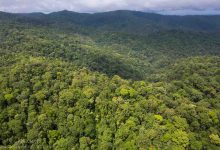The Central American nation of Costa Rica has laid out its long-term decarbonisation plans to become one of the world’s first, if not the first, zero-emissions nations.
Costa Rica’s Decarbonization Plan includes both short-term goals out to 2022 which are intended to support the country’s longer-term 2050 goals and also serves as the basis for Costa Rica’s plans to update its Nationally Determined Contributions in line with the Paris Agreement in 2020.
With a population of nearly 5 million people, Costa Rica is already one of the world’s climate action leaders and in October a study revealed that Costa Rica was one of only 16 countries which had set domestic greenhouse gas emissions reduction targets in line with their pledged contributions to the Paris Agreement.
The country also announced plans last year to become the first carbon-neutral country in the world by 2021.
“Decarbonization is the great task of our generation and Costa Rica must be one of the first countries in the world to accomplish it, if not the first,” said President Carlos Alvarado in May 2018 in his inauguration speech. “We have the titanic and beautiful task of abolishing the use of fossil fuels in our economy to make way for the use of clean and renewable energies.
While some headlines at the time suggested that Costa Rica was planning to ban fossil fuels, this was jumping the gun, somewhat.
“Some people have misunderstood the President’s declarations because we don’t plan to ban the use of fossil fuels, we plan to phase them out through new policies and incentives so that eventually, down the road, they will be useless,” said Costa Rica’s Minister of Environment and Energy Carlos Manuel Rodríguez, speaking to Vox in July.
According to the country’s newly-announced Decarbonization Plan, Costa Rica also boasts an electric grid that is “over 95% free of emissions and a very low rate of deforestation,” with 52% of the country’s territory covered by forest.
The new National Plan has identified technological transformation routes for each of its national sectors and presented actions in 10 sectoral focus areas with policy packages intended to be deployed over three periods – identified as “beginning” (2018 to 2022), “inflection” (2023 to 2030),” and “massive deployment (2031 to 2050). The plan also outlines eight cross-cutting strategies to enhance change.
The 10 sectoral focus areas are set out under four major headings: Transport and Sustainable Mobility; Energy, Green Building, and Industry; Integrated Waste Management; and Agriculture, land use change, and nature-based solutions.
Some of the focus areas under these headlines include moving towards zero emissions for 100% of the country’s busses and taxies by 2050 and zero emissions for 100% of sales of light vehicles by 2050 “at the latest”.
Costa Rica hopes to ensure its electric grid is capable of operating at 100% with renewable energies by 2030, and by 2050 it aims to ensure all commercial, residential, and institutional buildings are operating under low emissions standards.
“I congratulate Costa Rica for its leadership and permanent commitment to the environment,” said Michelle Bachelet, United Nations High Commissioner for Human Rights..
“It is a new sign of the will of Costa Rica to fulfill its commitments under the Paris Agreement and the Sustainable Agenda 2030. The launch of this National Plan makes Costa Rica one of the first countries in the world In promoting an initiative of this magnitude, we know that it will be an example to follow for all countries. ”
Costa Rica’s plan to decarbonise also includes eight cross-cutting strategies to enhance change based on the idea that it is also “necessary to modernise the institutional and tax frameworks as well as the education system through comprehensive approaches in order to consolidate the process of transformational change.
This can be achieved through the cross-cutting strategies which seek to address the social, financial, environmental, and technological considerations” such as “strengthening the principles of inclusion, respect for human rights, and promotion of gender equality”, a “green tax reform”, and implementing a “Finance and Foreign Direct Investment Strategy.”
“Decarbonising the global economy to drastically reduce the pollution of global warming is absolutely essential to ensure that our civilization can survive and thrive, and that is one of the reasons why I am so excited to see that Costa Rica continues its role as leader world to help solve the climate crisis with the rapid deployment of the strategic plan to completely decarbonize its economy,” said Al Gore, former vice president of the United States and Nobel Peace Prize laureate.
“Congratulations Costa Rica, because you are showing the rest of the world that it is definitely possible to make the transition to a low carbon economy today. Keep going with this great work. Their efforts give me and many others a lot of hope that we not only can, but we will also be able to solve the climate crisis. Thank you.”










